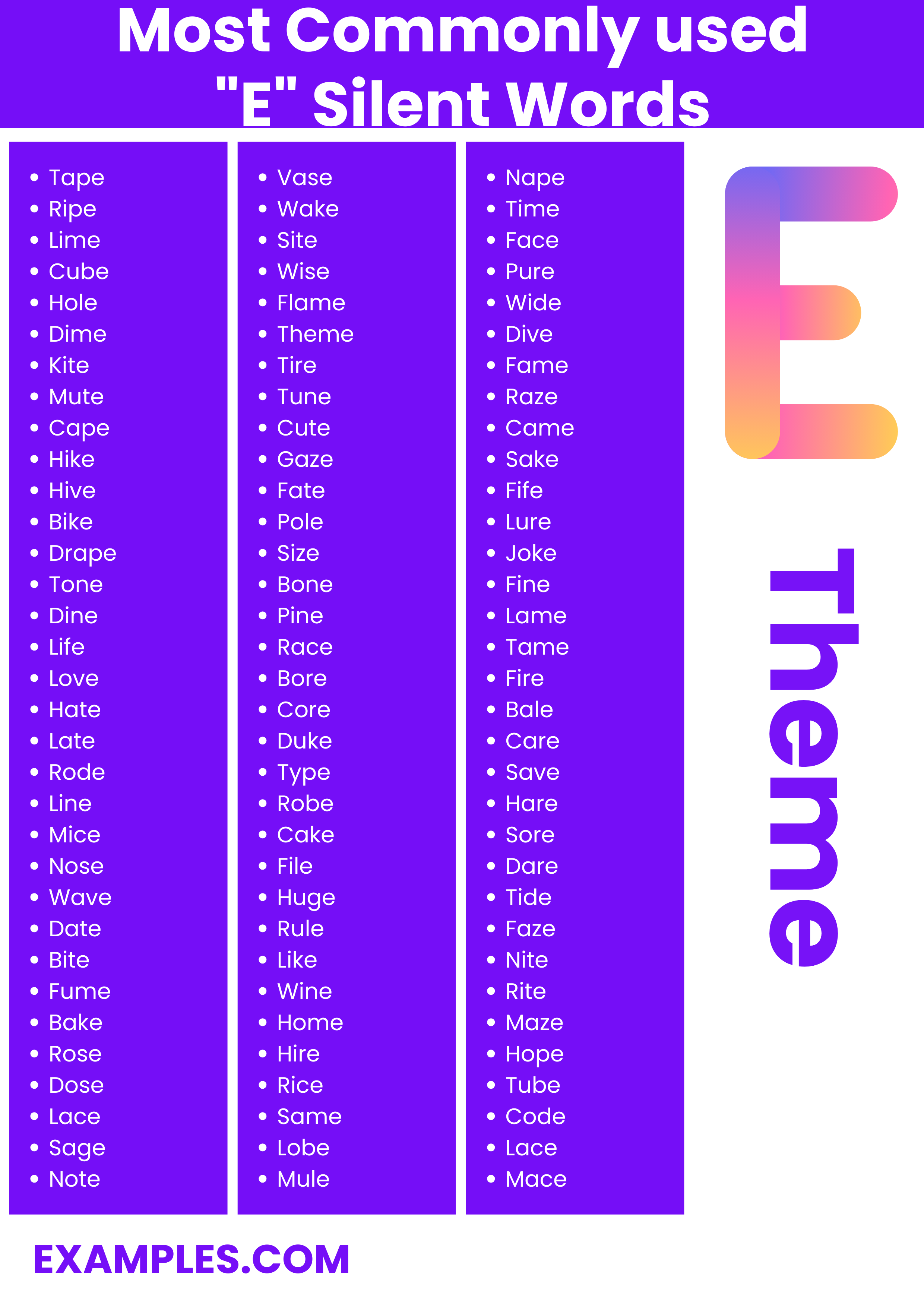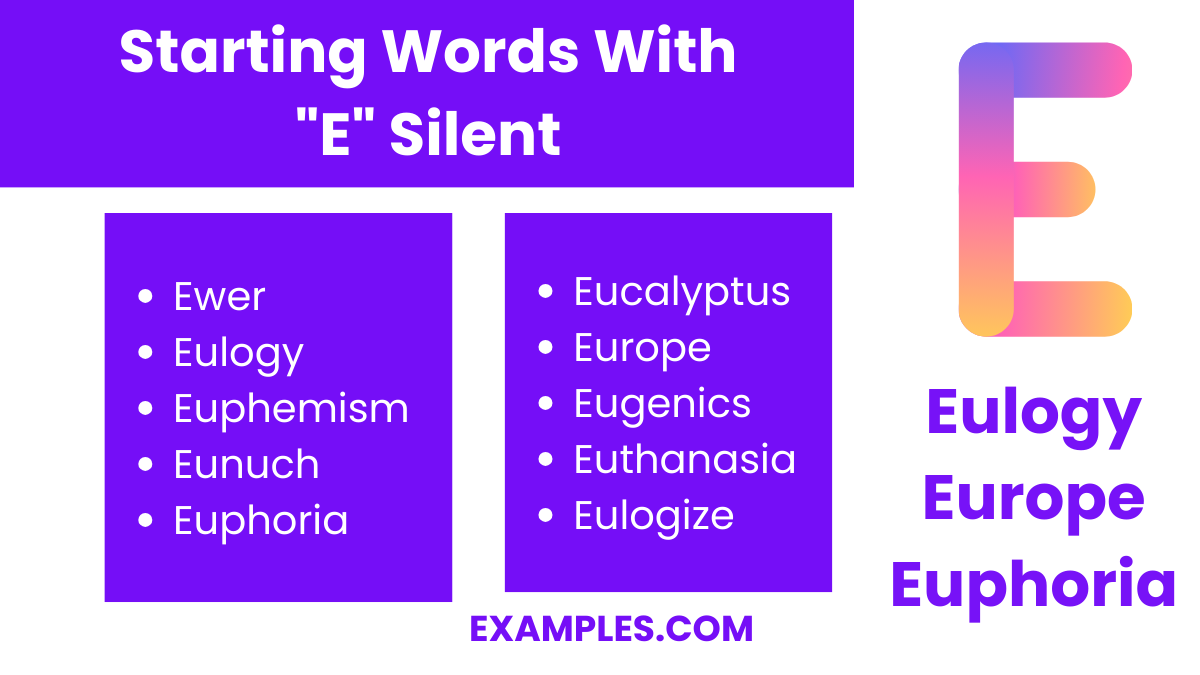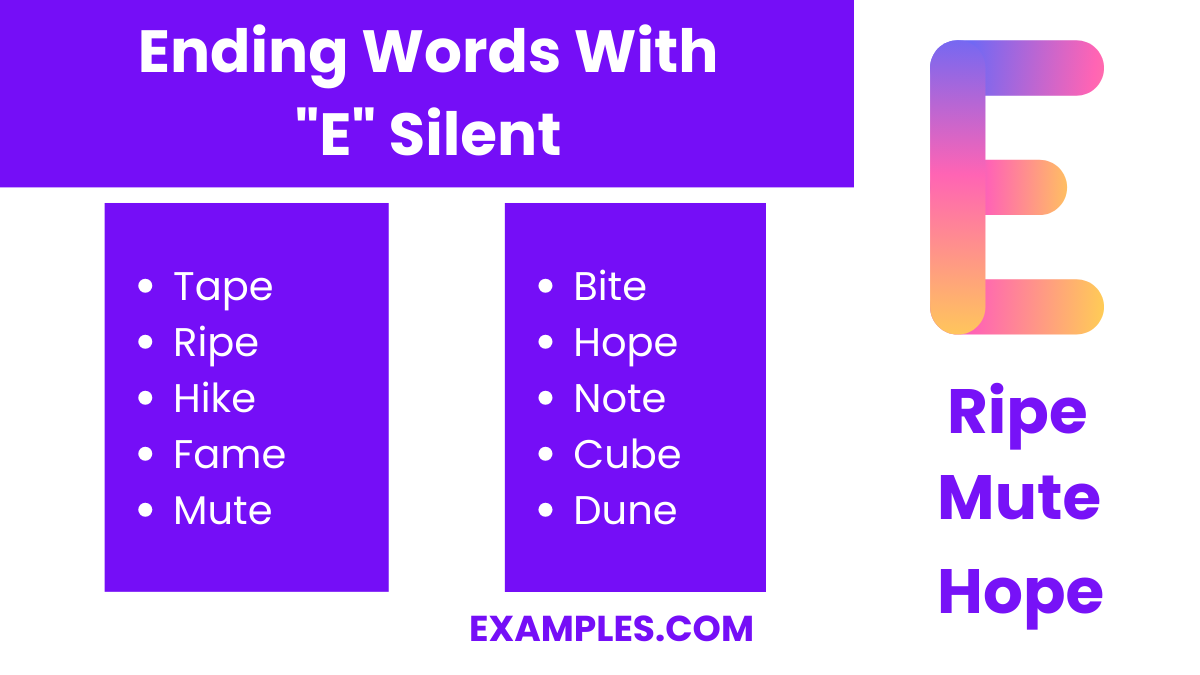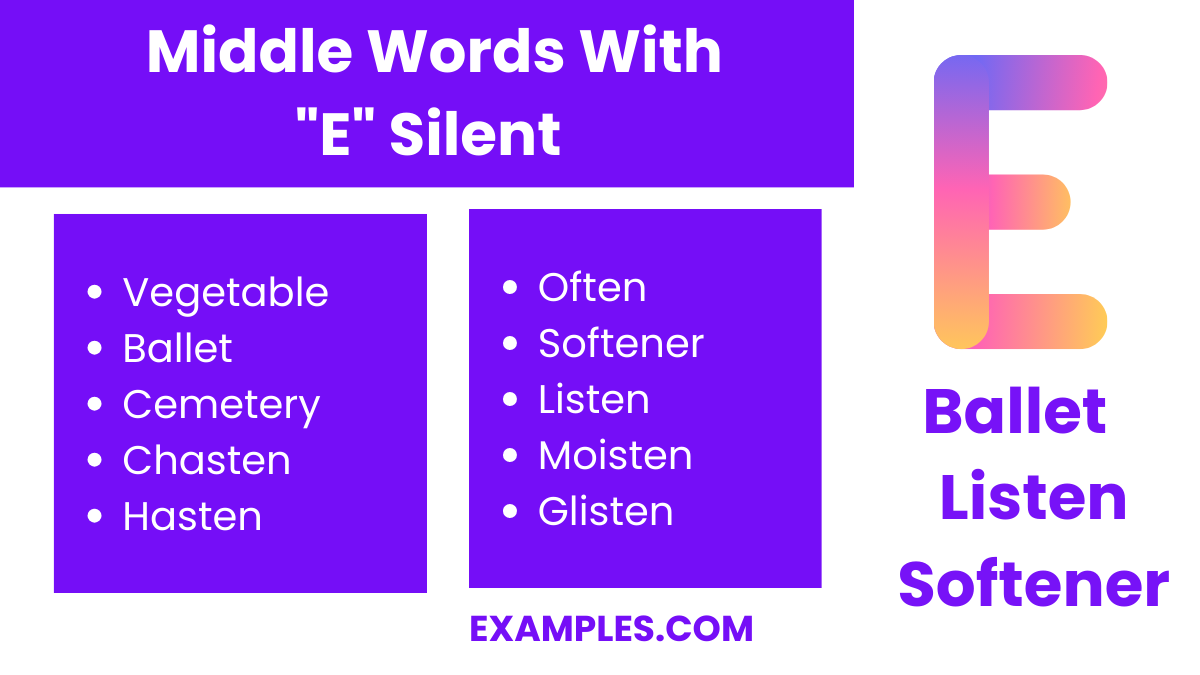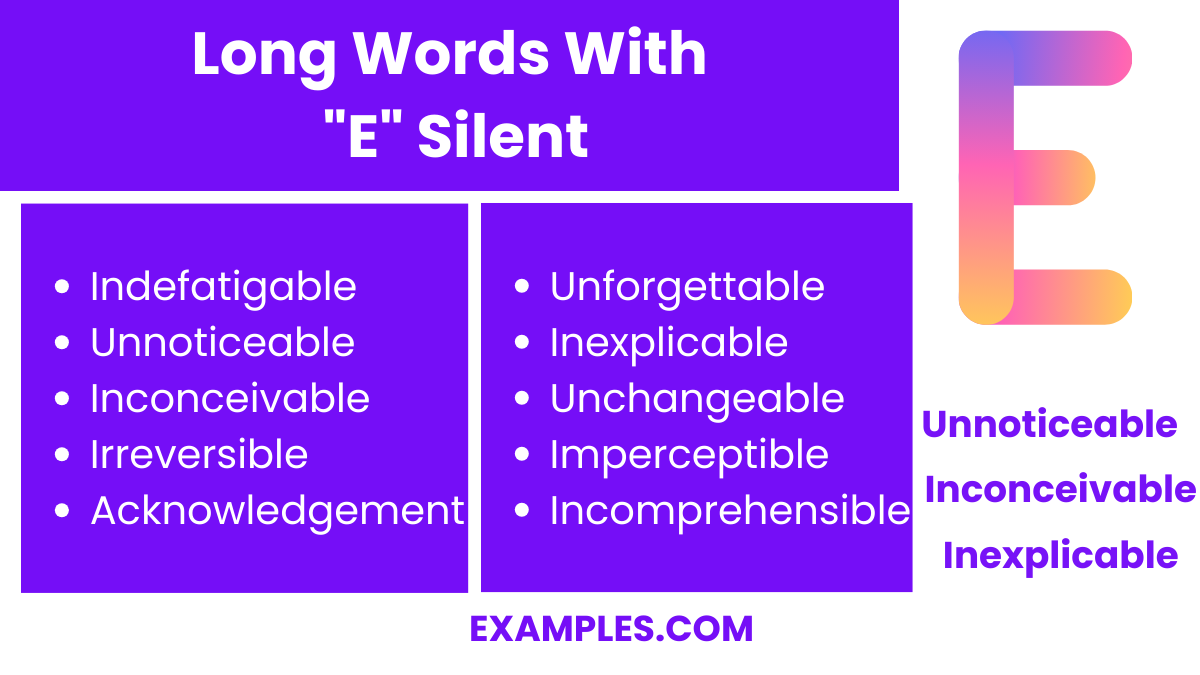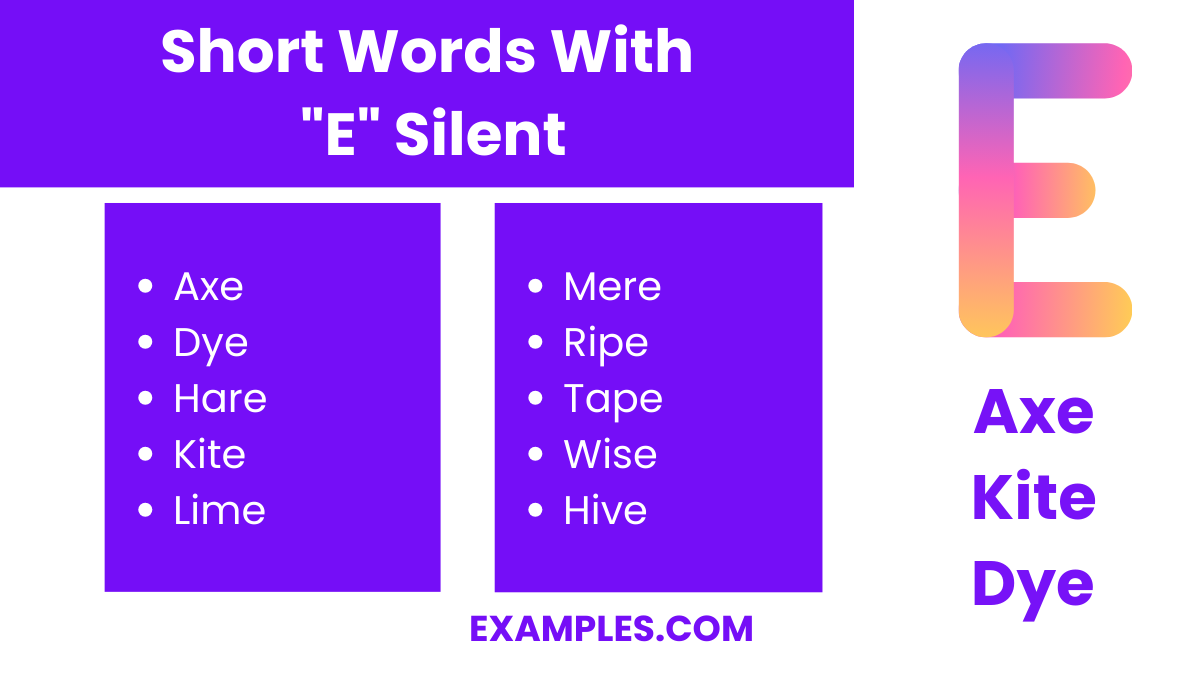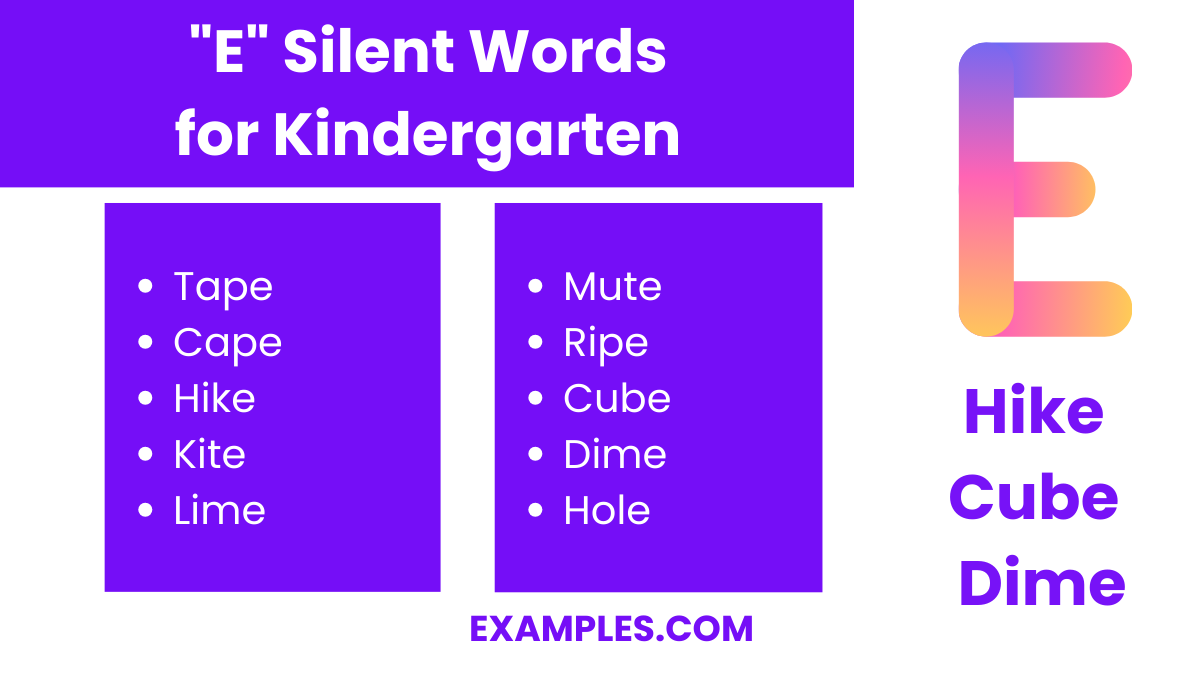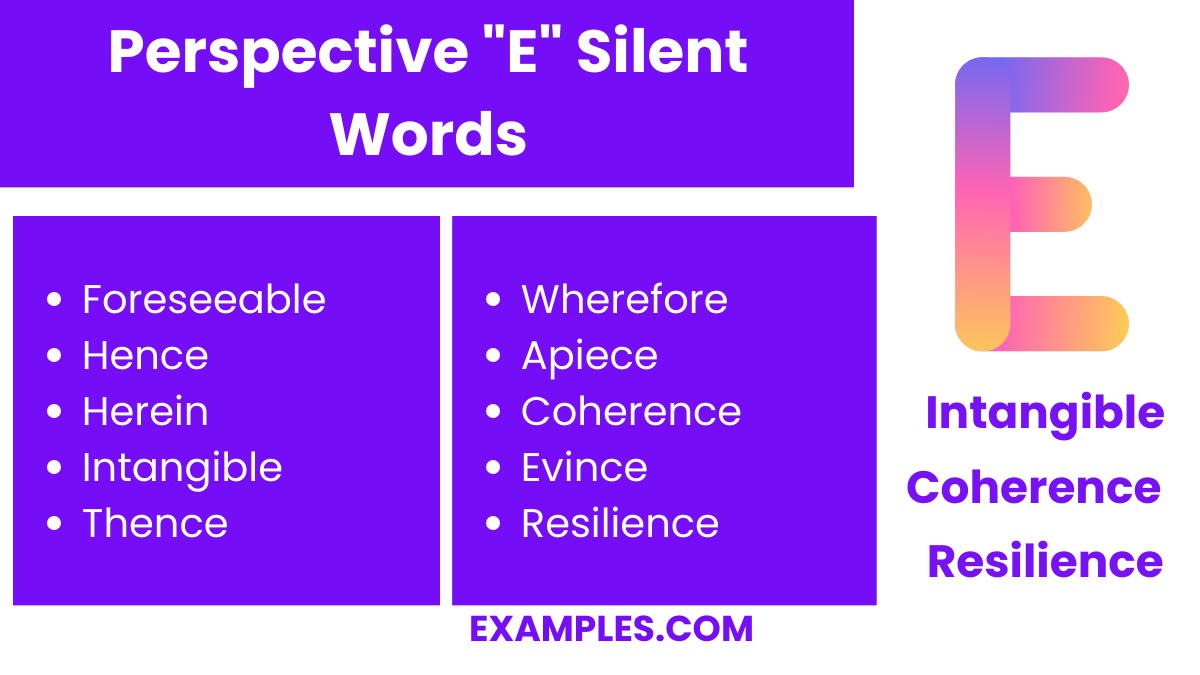450+ E Silent Words List, Meaning, PDF
The silent “E” in the English language is a fascinating enigma, often lurking at the end of words, shaping pronunciation without making a sound. This subtle letter can transform the spoken form, affecting vowels and lending elegance to the language’s rhythm. Understanding silent “E” words unlocks a new dimension of English, enhancing both comprehension and articulation. It’s a key topic for learners aiming to refine their linguistic prowess, offering insights into the intricate ballet of letters and sounds that define English pronunciation.
Download Most Commonly Used E Silent Words - PDF
100+ Most Commonly used “E” Silent Words
| Tape (/teɪp/) | Ripe (/raɪp/) | Lime (/laɪm/) | Cube (/kjuːb/) | Hole (/hoʊl/) | Dime (/daɪm/) |
| Kite (/kaɪt/) | Mute (/mjuːt/) | Cape (/keɪp/) | Hike (/haɪk/) | Hive (/haɪv/) | Bike (/baɪk/) |
| Drape (/dreɪp/) | Tone (/toʊn/) | Dine (/daɪn/) | Life (/laɪf/) | Love (/lʌv/) | Hate (/heɪt/) |
| Late (/leɪt/) | Rode (/roʊd/) | Line (/laɪn/) | Mice (/maɪs/) | Nose (/noʊz/) | Wave (/weɪv/) |
| Date (/deɪt/) | Bite (/baɪt/) | Fume (/fjuːm/) | Bake (/beɪk/) | Rose (/roʊz/) | Dose (/doʊs/) |
| Lace (/leɪs/) | Sage (/seɪdʒ/) | Note (/noʊt/) | Vase (/veɪs/) | Wake (/weɪk/) | Site (/saɪt/) |
| Wise (/waɪz/) | Flame (/fleɪm/) | Theme (/θiːm/) | Tire (/taɪər/) | Tune (/tjuːn/) | Cute (/kjuːt/) |
| Gaze (/ɡeɪz/) | Fate (/feɪt/) | Pole (/poʊl/) | Size (/saɪz/) | Bone (/boʊn/) | Pine (/paɪn/) |
| Race (/reɪs/) | Bore (/bɔːr/) | Core (/kɔːr/) | Duke (/djuːk/) | Type (/taɪp/) | Robe (/roʊb/) |
| Cake (/keɪk/) | File (/faɪl/) | Huge (/hjuːdʒ/) | Rule (/ruːl/) | Like (/laɪk/) | Wine (/waɪn/) |
| Home (/hoʊm/) | Hire (/haɪər/) | Rice (/raɪs/) | Same (/seɪm/) | Lobe (/loʊb/) | Mule (/mjuːl/) |
| Nape (/neɪp/) | Time (/taɪm/) | Face (/feɪs/) | Pure (/pjʊər/) | Wide (/waɪd/) | Dive (/daɪv/) |
| Fame (/feɪm/) | Raze (/reɪz/) | Came (/keɪm/) | Sake (/seɪk/) | Fife (/faɪf/) | Lure (/lʊər/) |
| Joke (/dʒoʊk/) | Fine (/faɪn/) | Lame (/leɪm/) | Tame (/teɪm/) | Fire (/faɪər/) | Bale (/beɪl/) |
| Care (/keər/) | Save (/seɪv/) | Hare (/hɛər/) | Sore (/sɔːr/) | Dare (/dɛər/) | Tide (/taɪd/) |
| Faze (/feɪz/) | Nite (/naɪt/) | Rite (/raɪt/) | Maze (/meɪz/) | Hope (/hoʊp/) | Tube (/tjuːb/) |
| Code (/koʊd/) | Lace (/leɪs/) | Mace (/meɪs/) | Pace (/peɪs/) |
Starting Words With “E” Silent
Embark on a linguistic journey with the intriguing phenomenon of silent “E” at the beginning of words, a rare but captivating feature in English. This exploration not only enriches vocabulary but also deepens understanding of English phonetics, offering a unique perspective on language nuances. Ideal for educators aiming to provide comprehensive language education, focusing on these words can enhance pronunciation skills and linguistic curiosity among students.
- Ewer – (/ˈjuːər/) A large jug with a wide mouth, used for carrying water.
- Eulogy – (/ˈjuːlədʒi/) A speech or piece of writing that praises someone or something highly.
- Euphemism – (/ˈjuːfəmɪz(ə)m/) A mild or indirect word or expression substituted for one considered to be too harsh or blunt.
- Eunuch – (/ˈjuːnək/) A man who has been castrated, especially one employed to guard the women’s living areas at an oriental court.
- Euphoria – (/juːˈfɔːrɪə/) A feeling or state of intense excitement and happiness.
- Eucalyptus – (/ˌjuːkəˈlɪptəs/) A fast-growing evergreen Australasian tree that has been widely introduced elsewhere.
- Europe – (/ˈjʊərəp/) A continent located entirely in the Northern Hemisphere and mostly in the Eastern Hemisphere.
- Eugenics – (/juːˈdʒɛnɪks/) The science of improving a population by controlled breeding to increase the occurrence of desirable heritable characteristics.
- Euthanasia – (/ˌjuːθəˈneɪziə/) The painless killing of a patient suffering from an incurable and painful disease or in an irreversible coma.
- Eulogize – (/ˈjuːlədʒaɪz/) Praise highly in speech or writing.
Ending Words With “E” Silent
Delve into the silent “E” at the end of words, a common and pivotal aspect of English pronunciation and spelling, especially within daily use English words. This silent “E” often plays a crucial role in modifying the pronunciation of preceding vowels, making it an essential study for language learners. Teachers can use these examples to illustrate the diverse functions of silent “E,” from indicating long vowel sounds to marking the word’s grammatical role, enriching the learners’ understanding and mastery of everyday vocabulary.
- Tape – (/teɪp/) A narrow strip of material, typically used to hold or fasten something.
- Ripe – (/raɪp/) Fully developed or matured and ready to be eaten or used.
- Hike – (/haɪk/) A long walk, especially in the countryside or wilderness.
- Fame – (/feɪm/) The state of being known or recognized by many people.
- Mute – (/mjuːt/) Refraining from speech or temporarily speechless.
- Bite – (/baɪt/) To use the teeth to cut into something.
- Hope – (/hoʊp/) A feeling of expectation and desire for a particular thing to happen.
- Note – (/noʊt/) A brief record of facts, topics, or thoughts, written down as an aid to memory.
- Cube – (/kjuːb/) A symmetrical three-dimensional shape, either solid or hollow, contained by six equal squares.
- Dune – (/djuːn/) A mound or ridge of sand formed by the wind, especially on the sea coast or in a desert.
Middle Words With “E” Silent
The silent “E” nestled within words is a less conspicuous feature, yet it plays a significant role in the phonetic and structural integrity of the English language. This segment provides a fascinating glimpse into the silent “E” within words, offering students and teachers alike a deeper appreciation for the intricacies of English spelling and pronunciation.
- Vegetable – (/ˈvɛdʒtəb(ə)l/) A plant or part of a plant used as food.
- Ballet – (/ˈbæleɪ/) A highly technical form of dance with its own vocabulary based on French terminology, characterized by light, graceful movements and the use of pointe shoes.
- Cemetery – (/ˈsɛməteri/) A burial ground; a graveyard.
- Chasten – (/ˈtʃeɪs(ə)n/) (Especially of God) discipline; punish; purify.
- Hasten – (/ˈheɪs(ə)n/) Be quick to do something.
- Often – (/ˈɒf(ə)n,ˈɒft(ə)n/) Frequently; many times.
- Softener – (/ˈsɒfnər/) A substance or device that softens something, especially fabric or water.
- Listen – (/ˈlɪs(ə)n/) Give one’s attention to a sound.
- Moisten – (/ˈmɔɪs(ə)n/) Make slightly wet.
- Glisten – (/ˈɡlɪs(ə)n/) Shine; glitter.
Long Words With “E” Silent
Dive into the elegance of long words with a silent “E,” a linguistic feature that often goes unnoticed yet significantly impacts pronunciation and meaning, especially in both singular & plural words. These words, with their extended structures and silent “E,” present a wonderful opportunity for advanced learners to expand their vocabulary and grasp the subtleties of English pronunciation.
- Indefatigable – (/ˌɪndɪˈfætɪɡəbl/) Persisting tirelessly.
- Unnoticeable – (/ʌnˈnoʊtɪsəbl/) Not easily noticed or seen; inconspicuous.
- Inconceivable – (/ˌɪnkənˈsiːvəbl/) Not capable of being imagined or grasped mentally; unbelievable.
- Irreversible – (/ˌɪrɪˈvɜːrsəbl/) Not possible to reverse.
- Acknowledgement – (/əkˈnɒlɪdʒmənt/) Acceptance of the truth or existence of something.
- Unforgettable – (/ˌʌnfəˈɡɛtəbl/) Impossible to forget; very memorable.
- Inexplicable – (/ˌɪnɪkˈsplɪkəbl/) Unable to be explained or accounted for.
- Unchangeable – (/ʌnˈtʃeɪndʒəbl/) Not able to be changed.
- Imperceptible – (/ˌɪmpəˈsɛptɪbl/) Impossible to perceive.
- Incomprehensible – (/ˌɪnkɒmprɪˈhɛnsɪbl/) Not able to be understood; not intelligible.
Short Words With “E” Silent
Short words with a silent “E” are foundational in English, subtly influencing pronunciation and grammatical function. These concise words are perfect for beginners and offer a gentle introduction to the concept of silent letters. Educators can use these words to teach fundamental spelling rules, helping students understand how a silent “E” can affect the sounds of other letters in a word.
- Axe – (/æks/) A tool typically used for chopping wood.
- Dye – (/daɪ/) A natural or synthetic substance used to add a color to or change the color of something.
- Hare – (/hɛər/) A fast-running, long-eared mammal that resembles a large rabbit.
- Kite – (/kaɪt/) A lightweight frame covered with paper, plastic, or cloth, designed to be flown in the wind at the end of a long string.
- Lime – (/laɪm/) A citrus fruit typically round, green, and containing acidic juice.
- Mere – (/mɪər/) That is solely or no more or better than what is specified.
- Ripe – (/raɪp/) (Of fruit or grain) developed to the point of readiness for harvesting and eating.
- Tape – (/teɪp/) A narrow strip of material, typically used to bind or fasten something.
- Wise – (/waɪz/) Having or showing experience, knowledge, and good judgment.
- Hive – (/haɪv/) A structure in which bees are kept, typically in the form of a dome or box.
E Silent Words for Kindergarten
Introducing silent “E” words to kindergarten students is a delightful way to explore the magic of English phonetics and spelling. These foundational words, with their unseen but influential “E,” provide an excellent starting point for young learners to understand how letters interact and shape pronunciation. This list is carefully selected to suit the vocabulary level of kindergarten students, making learning both accessible and engaging. Teachers can use these words to create fun, interactive lessons that foster a love of language and lay the groundwork for effective communication skills.
- Tape – (/teɪp/) A long, narrow strip of material used to stick things together.
- Cape – (/keɪp/) A sleeveless cloak, typically one that fastens at the neck.
- Hike – (/haɪk/) A long walk, especially in the countryside.
- Kite – (/kaɪt/) A toy that flies in the air, tied to a string.
- Lime – (/laɪm/) A green citrus fruit.
- Mute – (/mjuːt/) Not able to speak or make sound.
- Ripe – (/raɪp/) Fully grown and ready to eat, as in fruit.
- Cube – (/kjuːb/) A solid object with six equal square sides.
- Dime – (/daɪm/) A ten-cent coin in US currency.
- Hole – (/hoʊl/) An opening or gap in something solid.
Perspectives Words With “E” Silent
Words related to perspectives, carrying a silent “E,” enrich discussions about viewpoints, understanding, and cognitive processes. These words are particularly useful in academic and intellectual contexts, providing nuanced ways to express insights and observations. They’re invaluable tools for teachers aiming to encourage critical thinking and articulate expression in students.
- Foreseeable – (/fɔːˈsiːəbl/) Able to be foreseen or predicted.
- Hence – (/hɛns/) As a consequence; for this reason.
- Herein – (/hɪəˈrɪn/) In this document or book.
- Intangible – (/ɪnˈtændʒəbl/) Unable to be touched or grasped; not having a physical presence.
- Thence – (/θɛns/) From a place or source previously mentioned.
- Wherefore – (/ˈwɛəfɔːr/) For what reason or purpose.
- Apiece – (/əˈpiːs/) For each person or thing in a group.
- Coherence – (/kəʊˈhɪərəns/) The quality of being logical and consistent.
- Evince – (/ɪˈvɪns/) Reveal the presence of (a quality or feeling); indicate.
- Resilience – (/rɪˈzɪlɪəns/) The capacity to recover quickly from difficulties; toughness.
In conclusion, mastering words with a silent “E” is essential for English learners, as it significantly affects pronunciation and comprehension. This nuanced aspect of the language enriches vocabulary and enhances linguistic fluency, offering a deeper insight into the intricate workings of English phonetics and spelling. Understanding these words paves the way for improved communication and a more profound appreciation of the language’s complexity.



